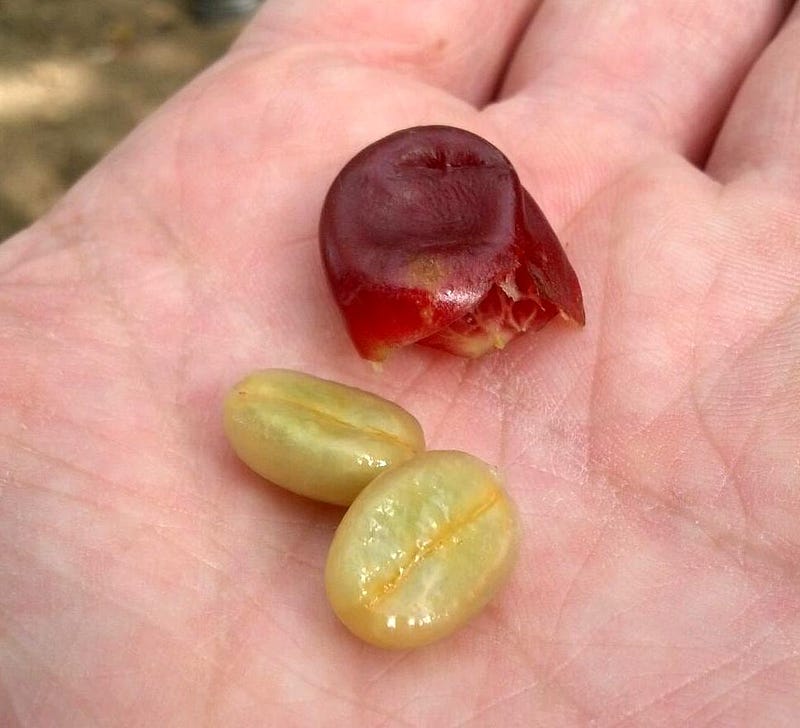Understanding Coffee's Impact on Health: A Comprehensive Overview
Written on
Chapter 1: The Essence of Coffee
Many individuals might not realize what coffee truly is. We refer to them as coffee "beans" due to their resemblance, yet this terminology is misleading. Unlike true beans, which come from various legumes, coffee "beans" are actually the seeds of a fruit known as the coffee cherry. These cherries thrive on the coffee tree, which naturally grows in tropical regions near the equator, typically in shaded areas of forests.

My previous experience running a specialty coffee business sparked my deep interest in coffee's plant pharmacology and its effects on the human body. Now, as I lead a health-tech company, I aim to merge my passion for coffee with insights into health. This guide aims to clarify how coffee influences your health, enabling you to determine its role in your life.
Chapter 2: The Journey of Coffee Seeds
To prepare coffee, the skin and pulp are removed from the seeds, which are then fermented and dried. Once dried, these seeds are sent to roasters globally, who transform them into the roasted coffee beans we know and love. Interestingly, a single coffee tree takes about five years to mature, yielding only about 1 kg (2 lbs) of green beans annually, which produces roughly half that amount after roasting.

Chapter 3: Chemical Reactions in Coffee
During roasting, numerous chemical reactions occur, resulting in coffee containing over 1,000 chemical compounds. Among these, caffeine and polyphenols stand out. It’s crucial to understand that caffeine acts as a natural pesticide produced by the coffee plant, which may contribute to its effects on our body. As we consume coffee, we are essentially introducing a significant amount of this natural pesticide into our system.
The first video titled "Is Coffee GOOD for You According to Science?" dives into the scientific analysis of coffee's health implications.
Chapter 4: Caffeine's Role in Sleep and Energy
A common misconception is that coffee provides energy. In reality, caffeine blocks adenosine receptors, which play a crucial role in regulating sleep. Thus, coffee doesn't actually energize you; it merely disrupts the natural sleep process. As highlighted by Michael Pollan, "caffeine borrows energy from your future, and gives it to you in the present."
Section 4.1: The Effects of Caffeine on Mood and Cognition
Despite its drawbacks, caffeine can enhance cognitive performance and elevate mood. This increased alertness is often mistaken for energy, but it places the body in a prolonged state of stress, raising levels of hormones such as adrenaline and cortisol.
Chapter 5: The Antioxidant Debate
Coffee also contains polyphenols, which have been linked to a lower risk of age-related diseases. However, the effectiveness and health implications of polyphenols remain debated, as they may exhibit both antioxidant and pro-oxidant properties. The primary polyphenol in coffee, chlorogenic acid, acts as a pesticide, leading to discussions on whether its effects are beneficial or harmful.
The second video titled "Coffee Enemas for Detoxification and Mental Health - A Complete Guide" explores alternative coffee uses for health.
Chapter 6: Mold and Mycotoxins in Coffee
A significant concern is the risk of mold growth in coffee, which can produce harmful mycotoxins. These toxins may have adverse health effects, emphasizing the importance of choosing high-quality coffee to minimize this risk.
Chapter 7: Research Insights on Coffee and Health
Numerous studies suggest links between coffee consumption and various health outcomes. For instance, a meta-analysis indicated that drinking up to six cups of coffee daily could reduce the risk of type 2 diabetes by up to 33%. Other research highlights its potential protective effects against heart disease, dementia, and stroke.
Chapter 8: Practical Insights from Health Practitioners
Feedback from health professionals indicates varied opinions on coffee's impact on health. For individuals with specific sensitivities or compromised metabolic health, coffee may pose challenges. Many practitioners recommend periodic breaks from coffee to assess individual responses.
Chapter 9: Conclusion: Coffee's Dual Nature
Ultimately, while coffee contains natural pesticides and can induce stress, it is also associated with potential health benefits. The key factors to consider in your coffee consumption include:
- Amount: Be mindful of how much coffee you drink, especially later in the day.
- Quality: Opt for high-quality coffee to reduce the risk of mold contamination.
- Roast: Choose light or medium roasts to preserve flavor and reduce harmful compounds.
- Origin: Prefer single-origin coffee for better quality assurance.
- Additives: Limit the addition of sugars and processed ingredients to maintain health benefits.
Balancing coffee's pros and cons will depend on individual circumstances and preferences. Personally, I enjoy two cups of high-quality coffee daily, appreciating its role in my life while remaining aware of its effects on my health.
In summary, what role will coffee play in your life moving forward?